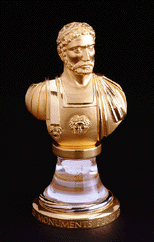
His Highness the Aga Khan
"The Muslim world, once a remarkable bastion of scientific & humanist knowledge, a rich & selfconfident cradle of culture & art, has never forgotten its past."
These words, spoken by His Highness the Aga Khan in 1996 at the commencement exercises of Brown University, reflect two of His Highness's great interests: the Muslim world and its distinguished history. A civilization with a long and fascinating heritage, the Muslim world has produced many of the world's most significant monuments: from the Alham-bra in Spain to the palaces of Solo and Yog-yakarta in Indonesia. Over the past two decades, no one has made a greater effort to understand and preserve this remarkable cultural heritage than the Aga Khan.
Born into a family whose history can be traced back forty-nine generations, the Aga Khan occupies a position of extraordinary responsibility as leader of the Shia Imami Ismaili Muslims, whose people live in twenty-five different countries. The Ismailis, like people from many other traditional cultures who are confronting modernity, have had to deal with the problems of adapting to the post-colonial world, with its sometimes violent and disruptive intrusions of free-market economics, its often unsettling new cultural forces, and its rapid changes in political institutions. The Aga Khan has made concerted efforts to create constructive channels for dialogue regarding change, channels built upon the foundations of history, tradition, and cultural heritage.
More than twenty years ago, the Aga Khan decided to address issues of cultural development by focusing on the most advanced form of artistic and social expression in Islam: architecture. He established the Aga Khan Award for Architecture as a means of recognizing achievements in the built environment. He established the Aga Khan Program for Islamic Architecture at Harvard University and the Massachusetts Institute of Technology; the Aga Khan Visiting Professorships at the University of Jordan in Amman and the Dawood College of Engineering and Technology in Karachi; and the research, documentation, and publication services of the Architectural Education Program, based in Geneva. His concern for the architectural heritage of Muslim communities culminated in the unique Historic Cities Support Program, which conceives cultural and economic development as being intimately related.
The restoration of the Baltit Fort in the northern regions of Pakistan, the creation of Azhar Park out of a rubble dump in the historic center of Cairo, the conservation and adaptive reuse of buildings in the Old Stone Town of Zanzibar, the revitalization of the fabled monuments of Samarkandall have been under-taken in just four years since the founding of the Aga Khan's Historic Cities Support Program. To these must be added the projects that have been recognized and furthered through the Aga Khan Award for Architecture, from the conservation of Old Sana'a in the capital of Yemen to the restoration of the historic core of Bukhara in Uzbekistan and the medina of Kairouan in Tunisia. Taken together, these projects give a sense of the range and impact of the Aga Khan's commitment to historic preservation.
The Aga Khan's efforts to preserve and use the past must be seen in the broader context of his concern for the social and political welfare of the Muslim world. As he has noted, perhaps no other world faith has "such a high concentration of people living in poverty and fear," for reasons that range from political disenchantment to the erosion and loss of cultural identity. From the outset, the Aga Khan has realized that in addition to their contributions to scholarship and history, the projects he supports are also interventions into living societies, interventions that are as urgent as they are important. As such, they are acts of faith that repeatedly test, and prove, the power of architecture to change people's lives.
The Aga Khan's dedication and commitment to architecture old and new have garnered him many awards and honors. He received the University of Virginia's 1984 Thomas Jefferson Memorial Foundation Medal in Architecture in honor of his work as a patron of architectural culture; the American Institute of Architects 1984 Institute Honor; the 1987 Gold Medal of the Higher Council of Spanish Architects, given by His Majesty King Juan Carlos; and the 1991 Médaille d'argent of the Académie d'Architecture of France. He also has been made an Honorary Fellow of the Royal Institute of British Architects.
In presenting His Highness the Aga Khan with the 1996 Hadrian Award, the World Monuments Fund honors a man who has devoted his life to preserving and improving our built environment. He has done this with vision, passion, and intelligence. The results are part of his legacy to the cultural heritage of our world.
 Vanity Fair Feature The 65 Leaders Who Shape and Rule the
World Today
Vanity Fair Feature The 65 Leaders Who Shape and Rule the
World Today
 Who is the Aga Khan? Feature article in Metropolis
Magazine
Who is the Aga Khan? Feature article in Metropolis
Magazine
 Islamic
Revelations more at Metropolis Magazine
Islamic
Revelations more at Metropolis Magazine
His Highness the Aga Khan Honored by WMF's famous Hadrian Award
 His Highness Aga Khan's
Speech at the Hadrian Award Presentation
His Highness Aga Khan's
Speech at the Hadrian Award Presentation
 David Rockefeller Speech
at Hadrian Award Ceremony
David Rockefeller Speech
at Hadrian Award Ceremony
 Lord Rothschild's Message
to His Highness Aga Khan
Lord Rothschild's Message
to His Highness Aga Khan
 Cyrus Vance's Remarks
Cyrus Vance's Remarks
 Michel David-Weil's
Address
Michel David-Weil's
Address
 Press Release
Press Release
 Article in Nation Newspaper
Article in Nation Newspaper
 Email us
Email us Back to Ismaili Web
Back to Ismaili Web
Website designed by Graphics Media Copyright 1996 All Rights Reserved